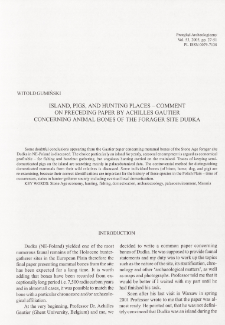- Wyszukaj w całym Repozytorium
- Piśmiennictwo i mapy
- Archeologia
- Baza Młynów
- Nauki przyrodnicze
Wyszukiwanie zaawansowane
Wyszukiwanie zaawansowane
Wyszukiwanie zaawansowane
Wyszukiwanie zaawansowane
Wyszukiwanie zaawansowane

Obiekt
Tytuł: Island, pigs, and hunting places - comment on precedings paper by Achilles Gautier concerning animal bones of the forager site Dudka
Inny tytuł:
Przegląd Archeologiczny T. 53 (2005)
Wydawca:
Instytut Archeologii i Etnologii Polskiej Akademii Nauk
Miejsce wydania:
Opis:
Typ obiektu:
Abstrakt:
Some doubtful conclusions appearing from the Gautier paper concerning mammal bones of the Stone Age forager site Dudka in NE-Poland is discussed. The choice particularly an island for yearly, seasonal encampment is argued as economical profitable - for fishing and hazelnut gathering, but ungulates hunting carried on the mainland. Traces of keeping semidomesticatedpigs on the island are searching mainly in palaeobotanical data. The controversial method for distinguishing domesticated mammals from their wild relatives is discussed. Some individual bones (of bison, horse, dog, and pig) are re-examining, because their correct identifications are important for the history of these species in the Polish Plain - time of occurrences, status in hunter-gatherer society including eventual local domestication
Czasopismo/Seria/cykl:
Tom:
Strona pocz.:
Strona końc.:
Szczegółowy typ zasobu:
Format:
Identyfikator zasobu:
oai:rcin.org.pl:60119 ; 0079-7138
Źródło:
IAiE PAN, sygn. P III 149 ; IAiE PAN, sygn. P III 272 ; IAiE PAN, sygn. P III 353 ; kliknij tutaj, żeby przejść
Język:
Prawa:
Prawa zastrzeżone - dostęp nieograniczony
Zasady wykorzystania:
Digitalizacja:
Instytut Archeologii i Etnologii Polskiej Akademii Nauk
Lokalizacja oryginału:
Biblioteka Instytutu Archeologii i Etnologii PAN
Dofinansowane ze środków:
Ministra Nauki i Szkolnictwa Wyższego ; Działalność upowszechniająca naukę (DUN)
Dostęp:
Kolekcje, do których przypisany jest obiekt:
- Repozytorium Cyfrowe Instytutów Naukowych > Kolekcje Partnerów > Instytut Archeologii i Etnologii PAN > Publikacje Pracowników i Wydawnictwa IAE PAN
- Repozytorium Cyfrowe Instytutów Naukowych > Kolekcje Partnerów > Instytut Archeologii i Etnologii PAN > Publikacje Pracowników i Wydawnictwa IAE PAN > Czasopisma bieżące
- Repozytorium Cyfrowe Instytutów Naukowych > Piśmiennictwo > Czasopisma/Artykuły
- Repozytorium Cyfrowe Instytutów Naukowych > Kolekcje Partnerów > Instytut Archeologii i Etnologii PAN > Publikacje Pracowników i Wydawnictwa IAE PAN > Czasopisma bieżące > Przegląd Archeologiczny
Data ostatniej modyfikacji:
2 lut 2022
Data dodania obiektu:
19 lis 2016
Liczba pobrań / odtworzeń:
580
Wszystkie dostępne wersje tego obiektu:
https://rcin.org.pl./publication/79806
Wyświetl opis w formacie RDF:
Wyświetl opis w formacie RDFa:
Wyświetl opis w formacie OAI-PMH:
Obiekty Podobne
Gumiński, Witold
Perzanowska, Joanna Makomaska-Juchiewicz, Małgorzata
Zakrzewska, Grażyna
Urban, Joanna
Osypińska, Marta
Sobociński, Marian

 INSTYTUT ARCHEOLOGII I ETNOLOGII POLSKIEJ AKADEMII NAUK
INSTYTUT ARCHEOLOGII I ETNOLOGII POLSKIEJ AKADEMII NAUK
 INSTYTUT BADAŃ LITERACKICH POLSKIEJ AKADEMII NAUK
INSTYTUT BADAŃ LITERACKICH POLSKIEJ AKADEMII NAUK
 INSTYTUT BADAWCZY LEŚNICTWA
INSTYTUT BADAWCZY LEŚNICTWA
 INSTYTUT BIOLOGII DOŚWIADCZALNEJ IM. MARCELEGO NENCKIEGO POLSKIEJ AKADEMII NAUK
INSTYTUT BIOLOGII DOŚWIADCZALNEJ IM. MARCELEGO NENCKIEGO POLSKIEJ AKADEMII NAUK
 INSTYTUT BIOLOGII SSAKÓW POLSKIEJ AKADEMII NAUK
INSTYTUT BIOLOGII SSAKÓW POLSKIEJ AKADEMII NAUK
 INSTYTUT CHEMII FIZYCZNEJ PAN
INSTYTUT CHEMII FIZYCZNEJ PAN
 INSTYTUT CHEMII ORGANICZNEJ PAN
INSTYTUT CHEMII ORGANICZNEJ PAN
 INSTYTUT FILOZOFII I SOCJOLOGII PAN
INSTYTUT FILOZOFII I SOCJOLOGII PAN
 INSTYTUT GEOGRAFII I PRZESTRZENNEGO ZAGOSPODAROWANIA PAN
INSTYTUT GEOGRAFII I PRZESTRZENNEGO ZAGOSPODAROWANIA PAN
 INSTYTUT HISTORII im. TADEUSZA MANTEUFFLA POLSKIEJ AKADEMII NAUK
INSTYTUT HISTORII im. TADEUSZA MANTEUFFLA POLSKIEJ AKADEMII NAUK
 INSTYTUT JĘZYKA POLSKIEGO POLSKIEJ AKADEMII NAUK
INSTYTUT JĘZYKA POLSKIEGO POLSKIEJ AKADEMII NAUK
 INSTYTUT MATEMATYCZNY PAN
INSTYTUT MATEMATYCZNY PAN
 INSTYTUT MEDYCYNY DOŚWIADCZALNEJ I KLINICZNEJ IM.MIROSŁAWA MOSSAKOWSKIEGO POLSKIEJ AKADEMII NAUK
INSTYTUT MEDYCYNY DOŚWIADCZALNEJ I KLINICZNEJ IM.MIROSŁAWA MOSSAKOWSKIEGO POLSKIEJ AKADEMII NAUK
 INSTYTUT PODSTAWOWYCH PROBLEMÓW TECHNIKI PAN
INSTYTUT PODSTAWOWYCH PROBLEMÓW TECHNIKI PAN
 INSTYTUT SLAWISTYKI PAN
INSTYTUT SLAWISTYKI PAN
 SIEĆ BADAWCZA ŁUKASIEWICZ - INSTYTUT TECHNOLOGII MATERIAŁÓW ELEKTRONICZNYCH
SIEĆ BADAWCZA ŁUKASIEWICZ - INSTYTUT TECHNOLOGII MATERIAŁÓW ELEKTRONICZNYCH
 MUZEUM I INSTYTUT ZOOLOGII POLSKIEJ AKADEMII NAUK
MUZEUM I INSTYTUT ZOOLOGII POLSKIEJ AKADEMII NAUK
 INSTYTUT BADAŃ SYSTEMOWYCH PAN
INSTYTUT BADAŃ SYSTEMOWYCH PAN
 INSTYTUT BOTANIKI IM. WŁADYSŁAWA SZAFERA POLSKIEJ AKADEMII NAUK
INSTYTUT BOTANIKI IM. WŁADYSŁAWA SZAFERA POLSKIEJ AKADEMII NAUK




































